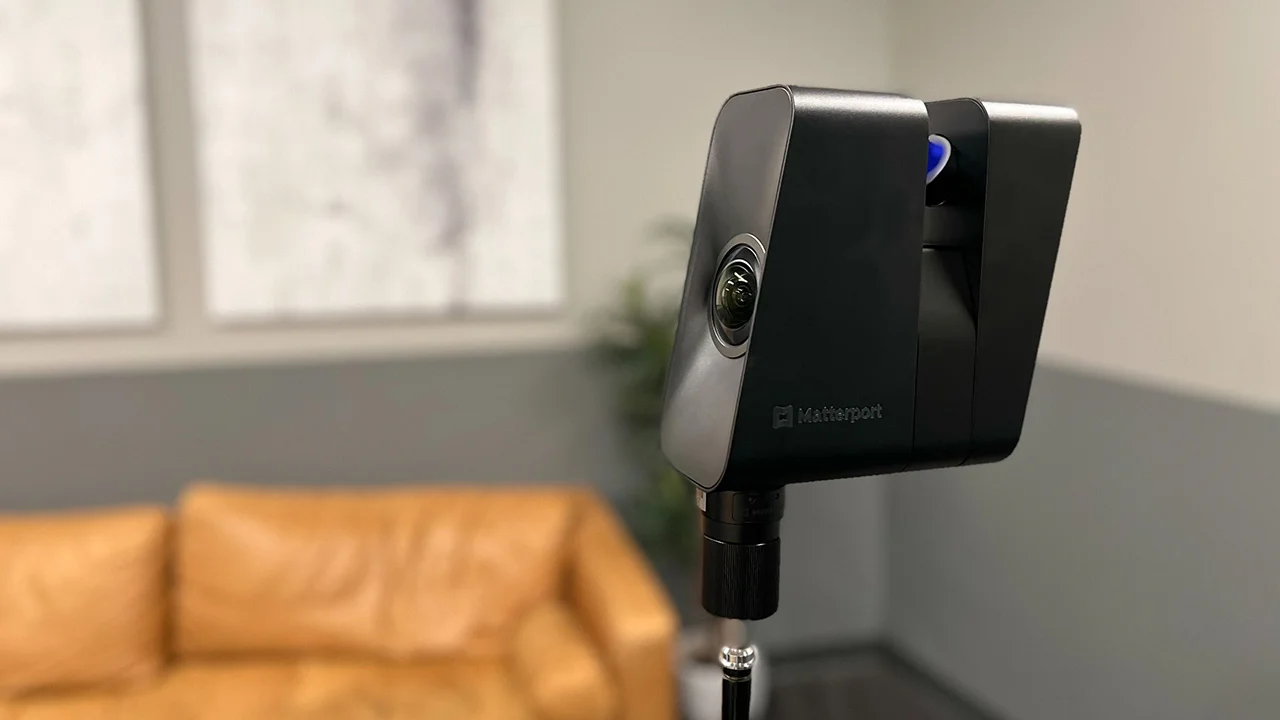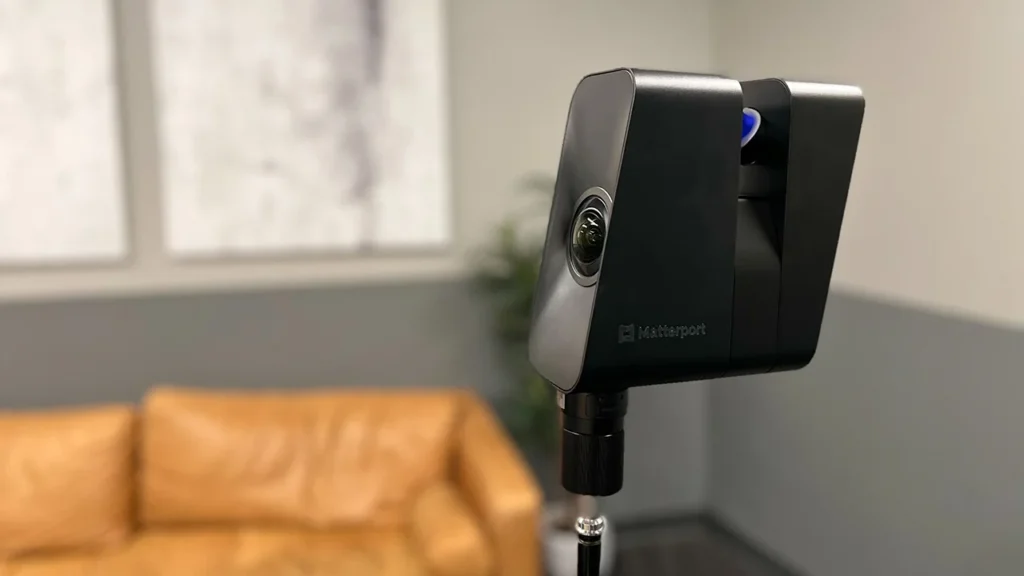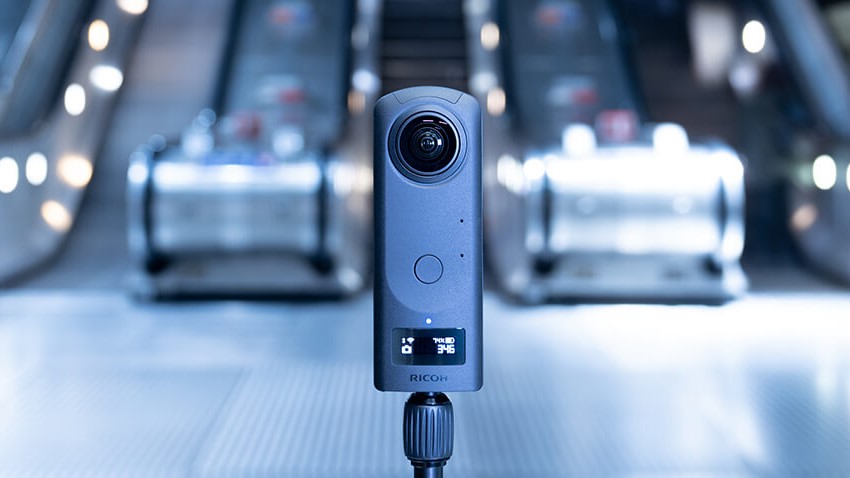Address
Studio 03
SUM Studios
1 Hartley Street
Sheffield
S2 3AQ
[email protected]
0114 399 1023

So you want to start producing virtual tours, but choosing the right equipment can be a challenge. With so many different options available, it can be tough to know which is the right choice for your business. Some equipment offers similar features while others have their own unique benefits.
In this blog, we’ll explore two of the most popular choices: the Matterport Pro 3 Vs Ricoh Theta 360 Z1. We’ll look at each camera’s specific features, the pros and cons, and explore some of the ideal use cases of each.
The Pro 3 is the latest 3D camera released by Matterport. The Pro 3 is designed to create virtual tours and digital twins for use in various sectors such as real estate, architecture, commercial property and construction. It utilises a combination of LiDAR (Light Detection And Ranging) technology with high resolution imagery to create detailed and accurate virtual tours. The Pro 3 is one of the market leading cameras of choice to provide accurate data, including precise measurements and floor plans.

The Matterport Pro 3 captures high-resolution images, giving viewers an exceptionally clear and accurate view of a space. This is great for showcasing properties or projects in the best possible light. Helping estate agents, architects, facility managers and designers present detailed and attractive visuals to clients, colleagues, contractors and potential buyers.
The Matterport Pro 3 is also equipped with LiDAR scanning technology that maps spatial data. This captures infomation such as of room dimensions, ceiling heights, and floor areas. This means the Pro 3 is great for architects and construction professionals who need accurate data for planning renovations, creating floor plans, and optimising space usage. This reduces the margin of error and increases efficiency in project planning and execution.
Despite its advanced capabilities, the Matterport Pro 3 is designed to be user-friendly, allowing even beginners to capture and process 3D data with minimal effort. The simple design and straightforward interface make it easy for users to quickly learn and operate the camera. Reducing the learning curve when capturing and creating virtual tours.
Overal the Matterport Pro 3 is versatile enough to be useful in various industries, including real estate, construction, hospitality, and many more. The Pro 3’s ability to create immersive and interactive virtual tours make it a great tool for marketing, renovations, and project management. The versatility of the Pro 3 makes it a reliable tool that it can meet the needs of different businesses across various sectors. The Pro 3 is also lighter and more portable compared to other 3D scanners, which is great for users who need to move the camera frequently or work in various locations.
While cheaper than many high end 3D scanners, the Matterport Pro 3 comes with a significant price tag, with the camera alone costing around £4,995.00. Users will then need to purchase additional equipment such as a tripod, carry case and potentially additional batteries (not cheap). The Pro 3 is also operated via an app, used to review scans while on-site and to mark and edit the space before uploading for processing. It’s recommended to use an Ipad pro with the Matterport Pro 3 which will set users back a further £1,000.
In addition to this initial expense, there are ongoing costs for using Matterport’s software and cloud services, which can add up over time. The Pro 3 cannot be used without a subscription to Matterport, leaving users with no alternative options. For small businesses or individuals looking for a more budget-friendly option, these high costs may be a problem. The need for on-going investment in subscriptions and additional services can be a substantial outlay, particularly for those with limited budgets.
While the Matterport Pro 3 is smaller and light weight when compared to other 3D scanners, it’s considerably larger and heavier than many other 360 cameras on the market. This size and weight make it less portable and harder to transport, especially for users who need to work in tight or crowded spaces. For professionals who need a camera that is easy to carry and set up in various locations, the Matterport Pro 3’s size and set-up could be a significant drawback.
The Pro 3’s battery life can also be a limitation, particularly during extended shoots or scanning large properties. Users may find themselves needing to recharge the camera batteries frequently or investing in additional batteries to complete a project. This need for constant recharging can be inconvenient and disrupt the workflow, especially during long sessions. For professionals who need reliable and long-lasting performance, the limited battery life can be a significant challenge.
The Matterport Pro 3 relies heavily on internet connectivity for uploading, processing, and sharing 3D scans. If the internet connection is slow or unreliable, these processes can be delayed, leading to slower project completion. The dependence on a good internet connection can be a drawback for users in areas with poor connectivity or those who need to work on the go. This requirement can limit the camera’s usability and efficiency in certain situations.
The Ricoh Theta Z1 is a top-tier 360-degree camera specifically engineered to capture spherical images and videos. The Ricoh Theta Z1 is best known for its advanced capabilities with a compact design. The Theta Z1 is particularly favoured by photographers, real estate agents, and virtual tour creators. This camera is designed to deliver high-quality visuals that a user-friendly the viewing experience, making it a valuable tool for professionals who want to showcase a space.

The Ricoh Theta Z1 boasts a remarkable 23-megapixel resolution and utilizes large, back-illuminated CMOS sensors to deliver sharp, detailed images. This high resolution ensures that images and video are vivid and true to life, making it ideal for creating immersive virtual tours.
The Ricoh Theta Z1 also excels in portability, weighing just 182 grams and boasting a compact design that makes it incredibly easy to carry and handle. This lightweight construction ensures minimal strain during extended use, making the Theta Z1 ideal for capturing 360-degree images and videos in various environments. Theta 360 z1 is easy to carry and convenient for capturing content on the move or in confined spaces. its small size allows for easy transportation in bags or pockets, without the burden of bulky equipment and carry cases.
Despite the high quality imagery it captures, the Theta Z1 maintains a user-friendly interface designed for easy operation. It features straightforward controls and a clear OLED display that simplifies settings adjustment and navigation. This usability mean photographers of all levels, from beginners to seasoned professionals, can efficiently capture compelling 360-degree content without extensive training.
The Theta Z1 can also integrate with leading virtual tour platforms, including Matterport, streamlining the workflow for professionals. This integration simplifies the process of uploading and sharing 360-degree content, enhancing visibility and accessibility across online. Real estate agents, marketers, and virtual tour creators can benefit from easy distribution of their content, improving client engagement and property showcasing.
As the Theta 360 Z1 is a 360 camera, it doesn’t capture any 3D data about a space. 3D data allows viewers to get precise measurements of spaces, which is important for industries like real estate, construction or interior design. Without this, the resulting virtual tour may not show the true size and layout of a space
While sufficient for shooting smaller spaces, the Theta Z1’s battery life can require careful management during prolonged use or when recording 4K video. Users may need to carry spare batteries or use external power sources, especially during extended shoots or live streaming events where power consumption is higher.
While capable of capturing quality images in various lighting conditions, the Theta Z1 can have reduced detail and clarity in low-light settings when compared to cameras equipped with low-light features or larger sensors. Users may need to bring extra lighting or adjust shooting times to achieve desired results in environments with low light.
Priced around £1000, the Theta Z1 is positioned as a premium 360-degree camera, which may pose an issue for individuals or small businesses exploring 360-degree photography. While justified for professionals requiring top-tier imaging capabilities and advanced features, the high price point may be a problem for casual users or hobbyists looking for an entry-level option.
Storage space can also be an issue. With a fixed internal storage capacity of 19GB, the Theta Z1 requires regular data transfer to external storage devices for effective content management. This limitation can impact workflow efficiency during extended shooting sessions. However, there is a 51GB version of the Theta Z1 but as you can guess that comes with a higher price tag.

The Matterport Pro 3 excels with high-resolution images and detailed 3D scans, making it an ideal choice for showcasing architectural details and large commercial properties. Professionals in real estate marketing, architecture, and construction can rely on the Pro 3 for its ability to provide immersive virtual tours that highlight every aspect of a property clearly and with precision.
In contrast, the Ricoh Theta Z1 offers superior image quality with its dual 23-megapixel sensors and support for RAW and JPEG formats. It captures high-resolution 360-degree images that are suitable for detailed residential real estate listings. While not as specialised for complex 3D scanning or larger projects as the Pro 3, the Z1 provides excellent image fidelity and versatility.
The Ricoh Theta Z1 is celebrated for its user-friendly design and quick setup, appealing to photographers, real estate agents, and content creators seeking a straightforward solution for capturing 360-degree content. Its easy to use interface enables users to create immersive virtual tours effortlessly without extensive training or setup time.
On the other hand, the Matterport Pro 3, while more slightly more complex to set up and operate, offers advanced features and customisation options that cater specifically to professional users. The Pro 3 provides comprehensive tools for editing, measurement, and customisation of virtual tours, which are crucial for delivering sophisticated projects.

The Ricoh Theta Z1 is positioned as a premium 360-degree camera with a price point of around £1000, making it a reasonable investment for individuals and businesses seeking high-quality imaging without ongoing subscription fees. Its one-time purchase model appeals to users looking for a versatile and reliable tool for capturing detailed 360-degree content.
On the other hand, the Matterport Pro 3 involves a considerably higher upfront investment due to the additional equipment. The additional cost is offset by the Pro 3’s advanced capabilities and professional-grade features. Despite the initial cost, the Pro 3 does offer long-term value through its ability to produce detailed virtual tours, precise measurements, and true-to-life digital twins that meet the high standards demanded by commercial clients and professional users.
While the Theta Z1 can be used with virtual tour platforms such as Matterport, it can also be used to produce 360 spherical images or 360 video without the need for a monthly or annual subscription. In comparison the Pro 3 can only be used with the Matterport platform. The exact costs for the Matterport platform vary based on the number of virtual tours you wish to have active at any given time. However, the need to pay an ongoing subscription fee for equipment that already has a high initial purchase cost can be a significant consideration for individuals or businesses looking to create virtual tours or digital twins.
In residential real estate, the Ricoh Theta Z1 shines as a solid choice. Offering a versatile tool for capturing residential properties, vacation rentals, and smaller spaces. Estate agents and residental property photographers will benefit from its portability, ease of use, one-time purchase model and image quality. The Ricoh Theta 360 Z1 is the perfect equipment for anyone looking to enhance property listings with immersive visual content that engages potential buyers or renters. However, for those wishing to take-on larger scale projects, the lack of advanced features and limited battery life make the Ricoh Theta 360 Z1 an unsuitible choice.
For commercial use and more complex projects, the Matterport Pro 3 is a market leading piece of equipment. Users who want to provide 3D scanning services to industries such as commercial real estate marketing, construction documentation, facilities management and hospitality should consider the Pro 3. It excels in delivering detailed imaging, precise measurements, and comprehensive virtual tours that are crucial for decision-making and marketing efforts. However, It’s important to be aware of the costs associated with purchasing the equipment and on-going subscription fees.
In choosing between the Matterport Pro 3 Vs Ricoh Theta 360 Z1, consider your specific needs and budget. The Pro 3 excels in professional settings with its detailed 3D scans and advanced features, while the Theta Z1 offers high-quality, versatile imaging suitable for residential and small projects. Both cameras provide unique benefits depending on your project requirements and desired outcomes.
Want to learn more about virtual tours, digital twins and 3D scanning? We have a range of great articles available, click here to check out our learning hub.